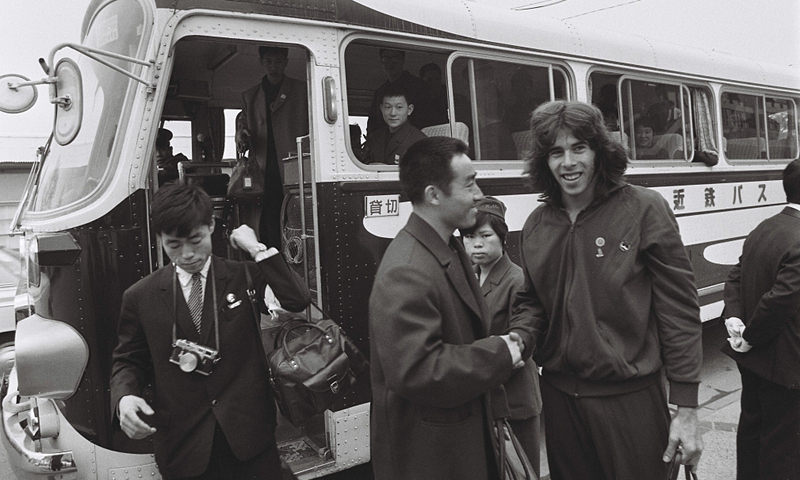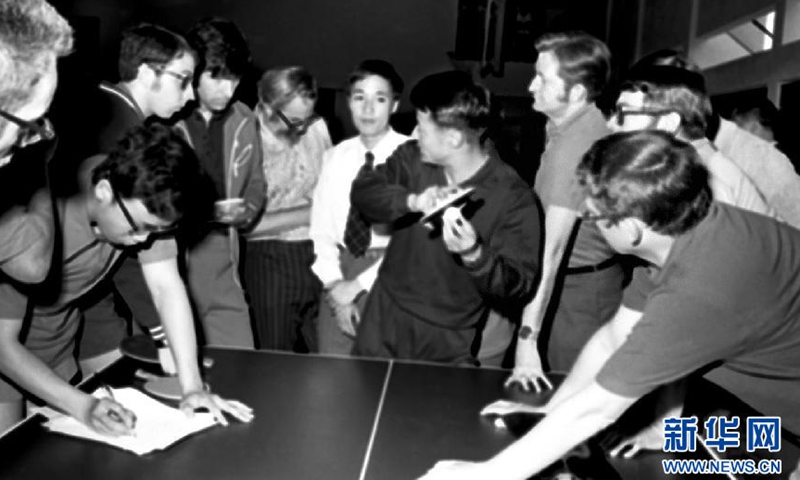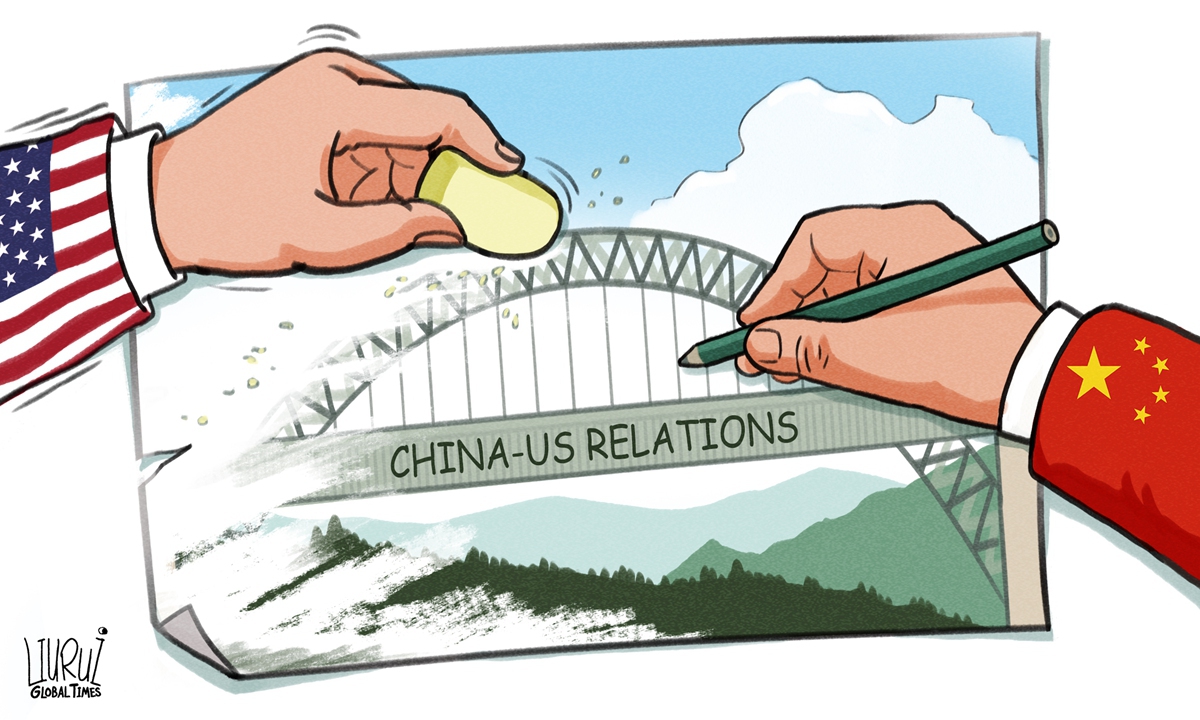Reflecting on 50th anniversary of ping-pong diplomacy on both sides of the Pacific amid stalemate in ties

American player Glenn Cowan (right) shakes hands with Chinese player Zhuang Zedong(center) after getting off a bus for Chinese players during the 31st World Table Tennis Championships on April 4, 1971 in Nagoya, Japan. Glenn Cowan, who missed a bus for his own team, accidentally boarded a bus for Chinese players, which led to a domino of events that saw the normalization the China-US relationship. File photo: VCG
Half a century ago, no one expected the visit of a group of American table tennis players to China would change the global landscape so dramatically. Now, with China and the US back in a period of such uncertainty in relations as observers point to almost a new Cold War, many observers are seeking signs whether something similar to the ping-pong diplomacy could be found to break the ice for the world's most important bilateral relations.
This year marks the 50th anniversary of ping-pong diplomacy. April 10 was when the American players arrived in Beijing half a century ago, prior to which China and the US had no official contact at all for more than two decades.
It is a historic occasion that both the Chinese and the Americans at the public level wouldn't miss to talk about and commemorate, indicating the efforts from both sides to try to break the current stalemate in the China-US relationship which to some degree resembles what it was 50 years ago.
"The competition is equally intense, but the interdependence is much greater and that requires cooperation at the same time as competition," Joseph Nye, University Distinguished Service Professor, Emeritus and former Dean of the Harvard's Kennedy School of Government, told the Global Times in an email interview.
History is always remembered
Lately, Chinese media outlets have run a number of articles with interviews with people concerned and witnesses to the ping-pong diplomacy, calling for the need for the two countries to draw wisdom from historic experiences.
Some US media have also carried stories since the very start of this year. Robert Hormats, who in 1971 was a junior member of then-secretary of state Henry Kissinger's National Security Council staff and his advisor on international economic policy, wrote in The Hill in January that "we could learn still from US-China 'ping-pong diplomacy.'" The Associated Press ran an article from a national sports columnist who recalled how ping-pong diplomacy extraordinarily changed the course of China-US relations and the pride of those American table tennis players who came to China and helped deliver "one of the great diplomatic coups of their time."
USA Table Tennis (USATT), a non-profit governing body for table tennis in the US, shared the AP article on its Twitter account on World Table Tennis Day of April 6, and wrote, "In the spirit of Ping Pong Diplomacy, we invite you to take the time to remember that table tennis brings people closer together through community and sports."
Greg Gilligan, chairman of American Chamber of Commerce in China, said in a video commemorative speech released on Thursday that ping-pong diplomacy has benefited numerous people of the two countries in further communicating and cooperating with each other in various fields.
"None of our member companies would be doing business in China today without the 'ping-pong diplomacy' efforts," he noted, calling for the both sides to try to solve conflicts and create a favorable environment for the development of China-US trade and commerce.
Chinese Ambassador to the US Cui Tiankai has mentioned "ping-pong diplomacy" on several occasions. One of the recent references was on February 4 at the commemoration of the 40th anniversary of the establishment of the sister province/state relationship between China's Anhui Province and Maryland. In 1972 when China's table tennis team conducted a reciprocal trip to the US, the University of Maryland was among the many places it visited.
Connie Sweeris, part of the US women's table tennis team that traveled to China in 1971 and her husband Dell Sweeris, part of the reception team and then the top-ranked player in the US who played the game with the visiting Chinese team in 1972, told the Global Times that commemoration activities can keep the legacy of ping-pong diplomacy alive, bring the new generation into the history of how the two countries broke ice, and promote bilateral relations.
Tao Wenzhao, a research fellow at the Institute of American Studies, Chinese Academy of Social Sciences, told the Global Times Friday that the friendly ping-pong diplomacy is not forgotten and remembering this period of history signals the will on both sides to restore relations.
"The China-US relationship is currently at a healing period as the Trump administration has hurt the relations to the greatest extent. Commemorating ping-pong diplomacy 50 years ago can guide public opinion toward each other rightly and inject positive momentum to restore bilateral ties. Hopefully, the leadership in both countries could take note," said Tao.

Photo: Xinhua
Relations now and then
If China and the US want to turn the page, it requires an acute sense from the leadership. Chairman Mao Zedong, who had looked for a way to improve relations with the US, seized on the World Table Tennis Championships in Nagoya, Japan to invite the American team to visit China on their way home. The administration of Richard Nixon, who had also been seeking to engage the Chinese, took it as the first solid evidence that China was interested in improving relations.
Then it was followed by Kissinger's historic trip a few months later. The next year Nixon made the grand trip to China. The process of normalization began, arguably the most critical development of the late 20th century.
"The ping-pong diplomacy helped realize official relations through people-to-people exchanges. The small ball was the prelude of the big ball of China-US relations at a difficult time, reflecting the importance of public diplomacy as always," Tao said.
Timing was important. At that time, the US was mired in the Vietnam War and hoped China could help it out because of China's influence on Vietnam. China had just walked out of the darkest days of the Cultural Revolution and was eager to revive its economy. Meanwhile, both saw the need to unlock their relations in the face of a hostile Soviet Union.
There is enmity between China and the US both now and then. Chinese and American soldiers fought each other during the Korean War (1950-53) and their ideologies were different. Today, they still have conflicting ideologies and face the contradiction of the US trying hard to maintain its global hegemony and China emerging from the new world order.
Like most Americans, the table tennis players who came to China in 1971 knew nothing about China except that China was a communist country. Unfortunately, today's Americans still hold the same belief even after China and the US have been deeply engaged with each other in the past 40 years and China has been greatly transformed, thanks to the Trump administration's overall suppression of China in the past four years.
Meanwhile, the Chinese people's impression of the US has changed. They start to view the US not as a beacon as the US itself claims, and realize the systematic flaws of the US fully exposed during the pandemic.

China-US relations Illustration: Liu Rui/GT
Chances still exist
The Biden administration has been seen as an opportunity for China and the US to mend ties, with rational voices from both sides calling for engagement and cooperation. But nearly 100 days in office, it still holds a strong and narrow-minded competition and confrontational mind-set toward China. The Anchorage talks in March between senior Chinese and US officials saw both sides deliver their concerns and red lines on a wide range of matters.
There are calls to find something similar to ping-pong at the public level to break the ice, but some Chinese experts believe this is something that should not be deliberately pursued.
"Five decades ago, China and the US were isolated from each other and their relationship started from scratch. Now even with strained ties, the two still have a huge amount of cooperation on various fields such as trade, investment and education. But the Chinese and Americans' perception toward each other is growing more and more negative. It is easier to normalize ties from scratch than from the middle," Wu Xinbo, dean of the Institute of International Studies at Fudan University, told the Global Times Friday.
Wu believes that despite obstacles, interaction between peoples is still needed.
"On the one hand, it remains the social basis of ties between the two countries; on the other, it will send a signal to the governments. Hopes from people to enhance exchanges are high. Although it does not have a direct impact on the governments' decision-making process, it serves as a promising signal," said Wu.
Zhang Tengjun, an assistant research fellow at the China Institute of International Studies, told the Global Times Friday that people-to-people exchanges at non-political fields such as education, music and sports can bring China-US relations to a relatively mild state.
Wu and Zhang's views are shared by Avery Goldstein, David M. Knott Professor of Global Politics and International Relations, Political Science Department of University of Pennsylvania.
"Although I do not think that 'people to people' contact can overcome strategic disagreements, I do think that 'people to people' contact (including business, education, the arts, and sports) can provide a buffer to prevent relations from deteriorating too rapidly, and they keep in place informal, personal ties that can be useful if and when leaders in both countries see it in their interests to improve state to state relations in the future," Goldstein told the Global Times in an email interview.
Zhang noted that China and the US have already sought to cooperate on some issues such as climate change, and another possible area is the environment.
"During the Obama era, China and the US established a Joint Committee on Environmental Cooperation, which played a vital role in facilitating cooperation. It saw no progress during Trump's tenure. The two countries have no conflicts in this area, so it would be easy to restart this mechanism. The key now is political will," said Zhang, adding that such small agenda could be a single spark that can start a prairie fire.
Zhang believes as Biden has rich experience in dealing with China-US relations and knows China well, he is not expected to walk the path of Trump.
"The two countries have the wisdom to steer the direction of bilateral relations. The Biden administration should realize the huge risks of decoupling between China and the US. The two countries can compete, but should stick to their commitment of cooperation with real actions. China can observe US words and deeds and maintain patience. At the same time, it can encourage communication between the two sides at all levels," said Zhang.
Hu Yuwei and Huang Lanlan contributed to the story



